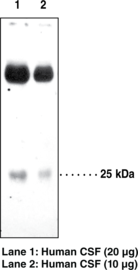服务热线
021-60498804
产品中心
/ Products Classification 点击展开+
| Cat. Number | 069286825528520 |
||||||||||||||||||||||
| Chemical Name | Prostaglandin D Synthase (lipocalin-type) Polyclonal Antibody |
||||||||||||||||||||||
| References |
Background ReadingZahn, M., Mäder, A., Schmidt, B., et al. Purification and N- Toh, H., Kubodera, H., Nakajima, N., et al. Glutathione- Melegos, D.N., Diamandis, E.P., Oda, H., et al. Immunofluorometric assay of prostaglandin D synthase in human tissue extracts and fluids. Clin Chem 42 1984-1991 (1996). Tokugawa, Y., Kunishige, I., Kuboto, Y., et al. Lipocalin- Urade, Y., Watanabe, K., and Hayaishi, O. Prostaglandin D, E, and F synthases. J Lipid Mediat Cell Signal 12 257-273 (1995). Nagata, A., Suzuki, Y., Igarashi, M., et al. Human brain prostaglandin D synthase has been evolutionarily differentiated from lipophilic- Kanaoka, Y., Fujimori, K., Kikuno, R., et al. Structure and chromosomal localization of human and mouse genes for hematopoietic prostaglandin D synthase. Eur J Biochem 267 3315-3322 (2000). Show all 7 Hide all but first 3
Description
Antigen:
human lipocalin-
1 Urade, Y., Watanabe, K., and Hayaishi, O. Prostaglandin D, E, and F synthases. J Lipid Mediat Cell Signal 12 257-273 (1995).
2
Toh, H., Kubodera, H., Nakajima, N., et al. Glutathione-
3
Tokugawa, Y., Kunishige, I., Kuboto, Y., et al. Lipocalin- 4 Melegos, D.N., Diamandis, E.P., Oda, H., et al. Immunofluorometric assay of prostaglandin D synthase in human tissue extracts and fluids. Clin Chem 42 1984-1991 (1996). 5 Kanaoka, Y., Fujimori, K., Kikuno, R., et al. Structure and chromosomal localization of human and mouse genes for hematopoietic prostaglandin D synthase. Eur J Biochem 267 3315-3322 (2000).
6
Zahn, M., Mäder, A., Schmidt, B., et al. Purification and N-
7
Nagata, A., Suzuki, Y., Igarashi, M., et al. Human brain prostaglandin D synthase has been evolutionarily differentiated from lipophilic- |
||||||||||||||||||||||





